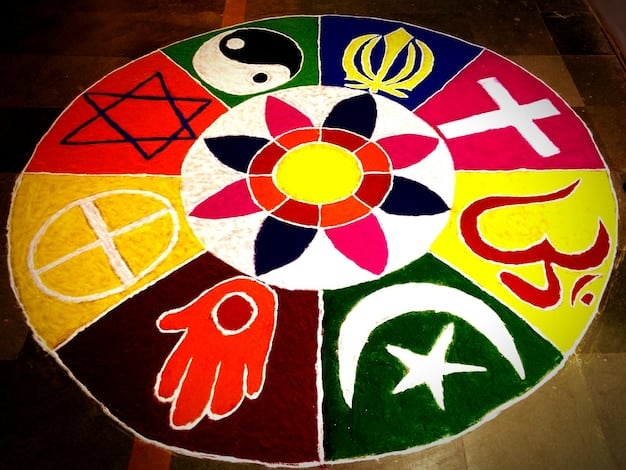Exploring Spiritual Paths: Find Your Perfect Fit

Exploring different spiritual paths involves understanding various traditions, practices, and philosophies to find one that resonates with your values and beliefs, ultimately leading to personal growth and fulfillment.
Embarking on a spiritual journey is a deeply personal and transformative experience. With a multitude of beliefs and practices available, **exploring different spiritual paths: a guide to finding the right fit for you** can feel overwhelming. This article aims to provide clarity and guidance as you navigate the diverse landscape of spirituality, helping you discover the path that best resonates with your inner self.
Understanding the Essence of Spirituality
Spirituality is often misunderstood as being synonymous with religion. However, spirituality is a broader concept that encompasses personal beliefs, values, and a search for meaning and purpose in life. It’s about connecting with something larger than oneself and cultivating inner peace and well-being.
At its core, spirituality is a quest for understanding the self, the universe, and one’s place within it. It encourages introspection, self-reflection, and the pursuit of personal growth. This can involve exploring different practices, traditions, and perspectives to find what truly resonates with you.
Defining Your Spiritual Needs
Before diving into specific spiritual paths, it’s essential to identify your individual needs and desires. Ask yourself what you are seeking from your spiritual journey. Are you looking for answers to life’s big questions? Are you seeking inner peace and emotional healing? Do you want to connect with a higher power or develop a stronger sense of community?
Common Misconceptions About Spirituality
One common misconception is that spirituality must be tied to a specific religion. While religion can be a source of spiritual guidance for many, it’s not the only path. Another misconception is that spirituality is about adhering to strict rules and doctrines. True spirituality is more about personal exploration and self-discovery.
- Understanding the difference between spirituality and religion.
- Identifying your personal spiritual goals and values.
- Challenging preconceived notions about what spirituality entails.
- Recognizing the importance of self-reflection in spiritual growth.
Spirituality is a deeply personal journey. By understanding its essence and identifying your individual needs, you can begin to explore the many paths available and find the one that best suits you.

Exploring Major Spiritual Traditions
The world is rich with diverse spiritual traditions, each offering unique perspectives and practices. Understanding these traditions can provide valuable insights and help you identify practices that resonate with you.
From ancient philosophies to modern movements, each tradition offers a unique lens through which to view the world and our place in it. By exploring their core tenets, you can gain a deeper understanding of your own beliefs and values.
Buddhism
Buddhism, founded by Siddhartha Gautama (the Buddha), emphasizes the Four Noble Truths and the Eightfold Path as a means to end suffering and achieve enlightenment. Key practices include meditation, mindfulness, and ethical conduct.
Hinduism
Hinduism encompasses a vast array of beliefs and practices centered around the concepts of dharma, karma, and reincarnation. It includes a pantheon of deities and emphasizes the importance of yoga, meditation, and devotion.
Christianity
Christianity centers on the teachings of Jesus Christ and emphasizes love, compassion, and forgiveness. Key practices include prayer, worship, and service to others.
Islam
Islam is based on the teachings of the Quran and emphasizes submission to Allah (God). Key practices include prayer, fasting, pilgrimage, and charitable giving.
- Understanding the core principles of each major spiritual tradition.
- Identifying common themes and differences among these traditions.
- Exploring the historical and cultural contexts of each tradition.
- Recognizing the value of diverse spiritual perspectives.
Exploring different spiritual traditions can broaden your understanding of the world and help you identify practices that align with your personal beliefs. This exploration can be a powerful step towards finding your own unique spiritual path.
The Role of Mindfulness and Meditation
Mindfulness and meditation are powerful tools for cultivating inner peace, self-awareness, and spiritual growth. These practices can help you connect with your inner self and gain a deeper understanding of your thoughts, emotions, and experiences.
By incorporating mindfulness and meditation into your daily routine, you can develop a greater sense of presence and awareness. This can lead to reduced stress, improved emotional regulation, and a stronger connection to your spiritual path.
Benefits of Mindfulness
Mindfulness involves paying attention to the present moment without judgment. It can help you become more aware of your thoughts, feelings, and sensations, allowing you to respond to them with greater clarity and compassion.
Different Meditation Techniques
There are many different meditation techniques, including mindfulness meditation, focused attention meditation, loving-kindness meditation, and transcendental meditation. Each technique offers unique benefits and may appeal to different individuals.
Integrating Mindfulness Into Daily Life
Mindfulness can be integrated into all aspects of daily life, from eating and walking to working and interacting with others. By practicing mindfulness in everyday activities, you can cultivate a greater sense of presence and awareness in all that you do.

- Understanding the benefits of mindfulness for spiritual growth.
- Exploring different meditation techniques to find one that suits you.
- Learning how to integrate mindfulness into your daily routine.
- Recognizing the transformative power of presence and awareness.
Mindfulness and meditation are invaluable tools for anyone seeking to deepen their spiritual practice. By cultivating these practices, you can enhance your self-awareness, reduce stress, and connect with your inner self in profound ways.
Connecting with Nature and the Universe
Connecting with nature and the universe can be a powerful way to experience awe, wonder, and a deeper sense of connection to something larger than oneself. This connection can foster spiritual growth and provide a sense of belonging and purpose.
Spending time in nature can be a transformative experience, allowing you to disconnect from the stresses of daily life and reconnect with the natural world. This can be as simple as taking a walk in the park, hiking in the mountains, or simply sitting under a tree.
The Power of Nature
Nature has a profound ability to heal and inspire. It can provide a sense of peace, tranquility, and connection to the earth. Observing the natural world can also offer valuable insights into the cycles of life, death, and rebirth.
Contemplating the Universe
Contemplating the vastness of the universe can evoke a sense of awe and wonder. Reflecting on the interconnectedness of all things can deepen your understanding of your place in the cosmos and foster a sense of humility and gratitude.
Practices for Connecting with Nature
There are many practices you can use to connect with nature, including forest bathing, nature walks, gardening, and simply spending time outdoors. Engaging with the natural world can be a powerful way to cultivate spiritual growth and inner peace.
- Understanding the spiritual benefits of connecting with nature.
- Exploring practices for deepening your connection to the natural world.
- Recognizing the healing and inspiring power of nature.
- Contemplating the vastness of the universe and your place within it.
Connecting with nature and the universe can be a transformative experience, fostering spiritual growth and providing a sense of belonging and purpose. By spending time in nature and reflecting on the mysteries of the cosmos, you can deepen your connection to something larger than yourself.
The Importance of Community and Mentorship
Joining a spiritual community or finding a mentor can provide valuable support, guidance, and accountability as you navigate your spiritual journey. Connecting with others who share similar values and beliefs can foster a sense of belonging and provide opportunities for growth and learning.
A spiritual community can offer a safe and supportive space to explore your beliefs, ask questions, and share your experiences. A mentor can provide personalized guidance and support, helping you navigate challenges and stay on track with your spiritual goals.
Benefits of Spiritual Community
A spiritual community can provide a sense of belonging, support, and connection. It can also offer opportunities for learning, growth, and service to others.
Finding a Spiritual Mentor
A spiritual mentor can provide personalized guidance, support, and accountability. Look for someone who embodies the qualities you admire and who is willing to share their wisdom and experience with you.
Online Spiritual Communities
In today’s digital age, there are many online spiritual communities that can provide support and connection. These communities can be a valuable resource for those who may not have access to a local community or who prefer to connect with others online.
- Understanding the benefits of joining a spiritual community.
- Identifying the qualities to look for in a spiritual mentor.
- Exploring online spiritual communities as a source of support and connection.
- Recognizing the importance of shared values and beliefs in spiritual growth.
Finding a spiritual community or mentor can be a transformative experience, providing valuable support, guidance, and accountability. By connecting with others who share your values and beliefs, you can deepen your spiritual practice and experience a greater sense of belonging and purpose.
Self-Reflection and Personal Growth
Self-reflection and personal growth are essential components of any spiritual journey. By taking the time to examine your thoughts, feelings, and experiences, you can gain a deeper understanding of yourself and your place in the world.
Self-reflection can involve journaling, meditation, spending time in nature, or simply taking a few moments each day to reflect on your experiences. Personal growth involves setting meaningful goals, challenging your beliefs, and taking action to create positive change in your life.
Practices for Self-Reflection
There are many practices you can use to cultivate self-reflection, including journaling, meditation, mindfulness, and spending time in nature. Experiment with different practices to find what works best for you.
Setting Spiritual Goals
Setting spiritual goals can provide direction and motivation on your spiritual journey. Consider what you want to achieve in your spiritual practice and set realistic and achievable goals to guide your progress.
Embracing Change and Challenges
Change and challenges are inevitable parts of life. By embracing these experiences with an open mind and a willingness to learn, you can grow and evolve on your spiritual path.
- Understanding the importance of self-reflection for spiritual growth.
- Exploring different practices for cultivating self-awareness.
- Setting meaningful spiritual goals to guide your journey.
- Embracing change and challenges as opportunities for growth.
Self-reflection and personal growth are essential components of any spiritual journey. By taking the time to examine your thoughts, feelings, and experiences, you can gain a deeper understanding of yourself and your place in the world. This can lead to greater clarity, compassion, and purpose in your life.
| Key Topic | Brief Description |
|---|---|
| 🧘♀️ Mindfulness | Cultivating present moment awareness without judgment. |
| 🌱 Personal Growth | Setting spiritual goals and embracing change. |
| 🤝 Community | Finding support through shared beliefs. |
| 🌿 Nature | Connecting with the natural world for inspiration. |
Frequently Asked Questions
▼
A spiritual path is a deeply personal journey, shaped by your beliefs, values, and practices. It doesn’t always align with organized religion, focusing more on your inner growth and connection to something greater.
▼
Mindfulness connects you to the present moment, enhancing self-awareness and emotional regulation. Through practices like meditation, it fosters inner peace and a deeper understanding of your thoughts and emotions.
▼
Community fosters a sense of belonging, offering support and shared experiences. It provides a space for learning, growth, and collective exploration of values and beliefs, especially when facing challenges.
▼
Connecting with nature evokes awe and wonder, fostering a sense of belonging and peace. Nature helps disconnect from daily stresses, offering insights into life cycles and enhancing spiritual growth.
▼
Absolutely. A spiritual journey is open to everyone, regardless of background or beliefs. It’s about self-discovery, personal growth, and finding a path that resonates with your inner self and provides meaning.
Conclusion
Exploring different spiritual paths is a deeply personal and transformative journey. By understanding the essence of spirituality, exploring various traditions, incorporating mindfulness and meditation, connecting with nature, engaging with a community, and committing to self-reflection, you can discover the path that best aligns with your values and beliefs. Remember, the most important thing is to stay true to yourself and listen to your inner guidance as you navigate the diverse landscape of spirituality.





